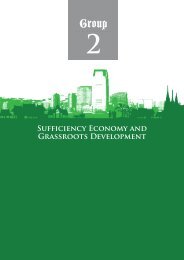Conflict, Legitimacy and Government Reform: Equitable Allocation of ...
Conflict, Legitimacy and Government Reform: Equitable Allocation of ...
Conflict, Legitimacy and Government Reform: Equitable Allocation of ...
You also want an ePaper? Increase the reach of your titles
YUMPU automatically turns print PDFs into web optimized ePapers that Google loves.
98 KPI Congress XI<br />
Creating a merit based civil service to prevent nepotism <strong>and</strong><br />
enhance performance: For example, in Singapore the<br />
government has consciously followed a stringent policy to<br />
cultivate <strong>and</strong> nurture the civil service, to ensure that it has the<br />
best talents to drive the country forward. Factors that have<br />
contributed to this amazing story include: the government<br />
follows a businesslike approach within the civil service,<br />
continuously analyzing the service delivery needs <strong>of</strong> the country<br />
<strong>and</strong> the emerging global trends, reforming the civil service<br />
according to such needs <strong>and</strong> trends, <strong>and</strong> utilizing the knowledge<br />
available from the vast business <strong>and</strong> educational sector <strong>and</strong><br />
industries that are present in the country; the government has<br />
continuously played a very active role in identifying, nurturing<br />
<strong>and</strong> grooming promising young talents for civil service leadership<br />
positions, including providing scholarships for local <strong>and</strong> foreign<br />
universities, <strong>and</strong> continuing development programmes; public<br />
servants in Singapore receive very competitive salaries, rivaling<br />
even the private sector; in addition to providing a relatively high<br />
salary structure for the civil service, the government has exhibited<br />
strong political will to combat corruption. 10<br />
Enhancing service quality to put citizens first – citizen’s<br />
charters: In the UK the Charter programme was one <strong>of</strong> the<br />
clearest articulations <strong>of</strong> the need to focus on the experience <strong>of</strong><br />
public service users, <strong>and</strong> for services to be responsive to the<br />
people using them. It also popularised the ideas that performance<br />
should be measured <strong>and</strong> measurements made public, <strong>and</strong> that<br />
information about services should be readily available in plain<br />
language. The Public Service Committee concluded in its 1997<br />
report that The Citizens’ Charter had made “a valuable<br />
contribution to improving public ser vices”. It led to<br />
10 Robert, Bern<strong>and</strong>o. The Role <strong>of</strong> Incentives in Civil Service <strong>Reform</strong>: the Singapore<br />
Story, http://regionalcentrebangkok.undp.or.th/practices/capacitydevelopment/<br />
documents Evidence_from_the_field_series_Singapore_Civil_Service_<strong>Reform</strong>_through_<br />
Incentives_-_formated.pdf.














